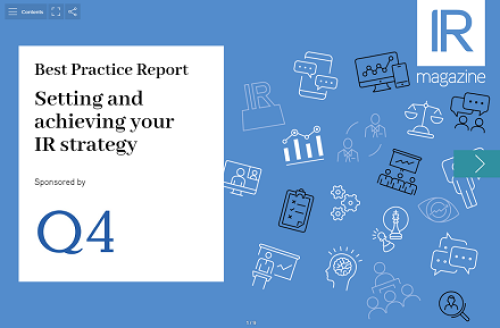Reflections on a quarter-century of IR to mark IR Magazine's silver anniversary
I started my career in IR as a result of the changes enshrined in the 1985 UK Companies Act, which allowed public companies, under the fabled powers of Section 212, to make inquiries of their shareholders regarding their real ownership.
In the heady days of 1980s market liberalization, this was a mechanism used as much to chase down victims as to help defend against predators.
This additional transparency to the share register meant many scandals could be investigated more thoroughly than was previously possible.
The discovery of the Blue Arrow/County NatWest and Guinness frauds of the 1980s and the Robert Maxwell pension scandal of the 1990s, for example, were all partly a result of the legislation whose object was initially to help UK companies defend themselves from takeover by stealth by overseas businesses. Section 212 is really the basis of the UK IR industry. From this comparatively simple tool stemmed the range of reporting and insight that is now the backbone of the investor communication process.
Section 212 is really the basis of the UK IR industry. From this comparatively simple tool stemmed the range of reporting and insight that is now the backbone of the investor communication process.
Before the 1980s, the UK stock market was predominately a British affair but over time the increasingly larger slice of UK PLC being snapped up by overseas investors meant corporate professionals involved in shareholder relations (we know them now as IROs) had an increasingly varied audience to manage.
The late 1990s saw the rise of hedge funds and proprietary traders, and the increasing popularity of synthetic ownership of stock via derivative positions.
Stock lending moved from the occasional to the normal; betting on share prices going down became almost as popular as betting on them going up; spread-betting moved equity ownership from the City to the High Street bookmakers. Speculation became a global pastime and the regulators could barely keep up.
The technology boom and bust of the early 2000s put a brake on the pace of change as markets licked their wounds and regulators applied a sticking plaster of new laws to end market abuse.
But then debt became fashionable as shares lost their allure under the regulatory burden of greater market transparency, and US mortgage debt brought down the banks in the US and the UK.
IROs could barely catch their breath before facing the new challenges of stock disappearing into dark pools, growing share price volatility from high-frequency trading and trying to manage their firm’s reputation in the increasingly hysterical world of social media.
It’s been quite a journey these last 25 years in IR; no doubt the next 25 will see more changes. I’m sure IR Magazine will be covering them, come what may.
Richard Davies is founder and managing director of RD:IR.










